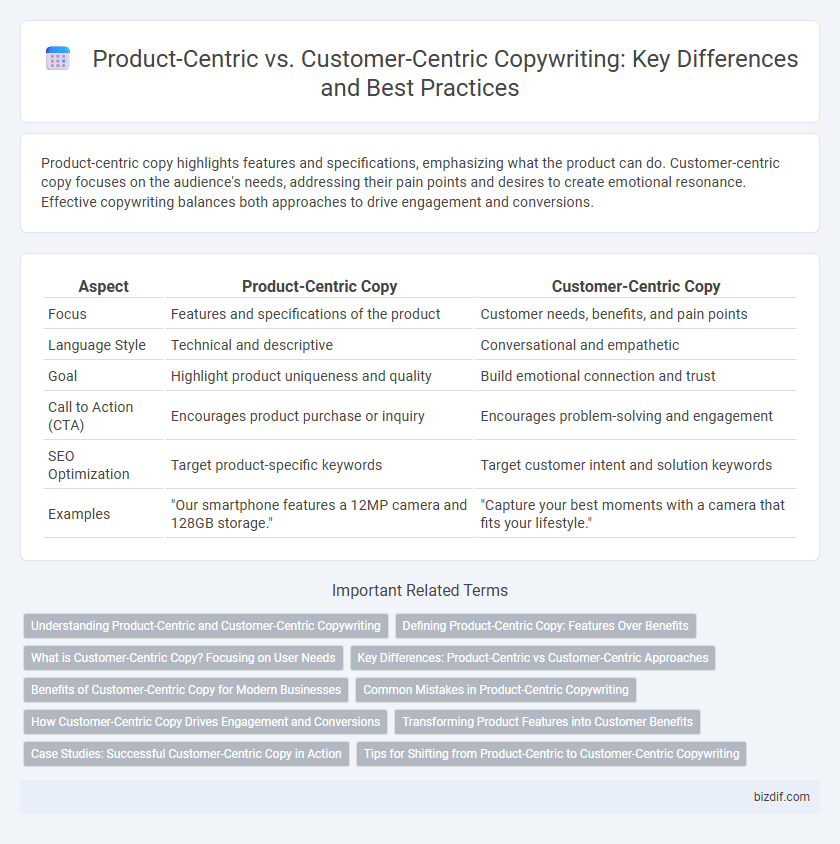Product-centric copy highlights features and specifications, emphasizing what the product can do. Customer-centric copy focuses on the audience's needs, addressing their pain points and desires to create emotional resonance. Effective copywriting balances both approaches to drive engagement and conversions.
Table of Comparison
| Aspect | Product-Centric Copy | Customer-Centric Copy |
|---|---|---|
| Focus | Features and specifications of the product | Customer needs, benefits, and pain points |
| Language Style | Technical and descriptive | Conversational and empathetic |
| Goal | Highlight product uniqueness and quality | Build emotional connection and trust |
| Call to Action (CTA) | Encourages product purchase or inquiry | Encourages problem-solving and engagement |
| SEO Optimization | Target product-specific keywords | Target customer intent and solution keywords |
| Examples | "Our smartphone features a 12MP camera and 128GB storage." | "Capture your best moments with a camera that fits your lifestyle." |
Understanding Product-Centric and Customer-Centric Copywriting
Product-centric copywriting emphasizes the features, specifications, and benefits of a product, targeting what the product is and how it works. Customer-centric copy focuses on the needs, pain points, and desires of the audience, highlighting how the product solves problems and improves their lives. Understanding the distinction helps marketers create messages that either showcase product innovation or resonate emotionally with potential buyers, enhancing engagement and conversion rates.
Defining Product-Centric Copy: Features Over Benefits
Product-centric copy emphasizes detailed descriptions of a product's features, focusing on specifications, functionalities, and technical attributes. It aims to inform the audience about what the product is and how it works, often highlighting innovative materials, design elements, or advanced technology. This approach prioritizes product information over emotional appeal or customer needs, concentrating on the product itself rather than the consumer experience.
What is Customer-Centric Copy? Focusing on User Needs
Customer-centric copy prioritizes understanding and addressing the user's needs, preferences, and pain points to create a personalized and engaging message. This approach emphasizes benefits and solutions that resonate directly with the target audience rather than just highlighting product features. By aligning the copy with the customer's emotions and desires, businesses can foster trust and drive higher conversion rates.
Key Differences: Product-Centric vs Customer-Centric Approaches
Product-centric copy emphasizes features, specifications, and unique selling points of the product, aiming to highlight what makes the item superior or innovative. Customer-centric copy prioritizes the audience's needs, pain points, and emotional triggers, crafting messages that resonate with their desires and solve specific problems. The key difference lies in focusing on the product's attributes versus tailoring the message to the customer's experience and benefits.
Benefits of Customer-Centric Copy for Modern Businesses
Customer-centric copy drives higher engagement by addressing specific pain points and desires, fostering stronger emotional connections that boost brand loyalty. It enhances conversion rates through personalized messaging tailored to customer needs, increasing the likelihood of purchase decisions. Modern businesses leveraging customer-centric copy gain competitive advantages by creating meaningful experiences that resonate deeply with target audiences.
Common Mistakes in Product-Centric Copywriting
Product-centric copywriting often focuses excessively on product features and technical specifications, neglecting the emotional and practical needs of the customer. This mistake results in messages that fail to connect with the audience, reducing engagement and conversion rates. Effective copy should balance product benefits with customer pain points and desires to drive action and loyalty.
How Customer-Centric Copy Drives Engagement and Conversions
Customer-centric copy focuses on addressing the specific needs, pain points, and desires of the target audience, making the message more relatable and compelling. By highlighting benefits and emotional triggers rather than just product features, this approach boosts user engagement and encourages action. Data shows that companies employing customer-centric copy see higher conversion rates and stronger brand loyalty compared to product-centric messaging.
Transforming Product Features into Customer Benefits
Transform product features into clear customer benefits by emphasizing how each attribute solves problems or enhances the user experience, making the message more relatable and impactful. Highlight specific outcomes like saving time, increasing efficiency, or improving satisfaction to shift the copy from product-centric to customer-centric. This approach drives engagement and conversions by aligning the copy with the audience's needs and desires.
Case Studies: Successful Customer-Centric Copy in Action
Case studies reveal that customer-centric copy significantly boosts engagement by addressing specific audience pain points and desires rather than simply listing product features. Brands like Apple and Amazon demonstrate increased conversion rates through empathetic storytelling and personalized messaging, emphasizing benefits and emotional connection over technical details. Data shows customer-centric copy can improve ROI by up to 30% compared to product-focused content, underscoring its effectiveness in driving consumer action.
Tips for Shifting from Product-Centric to Customer-Centric Copywriting
Shift from product-centric to customer-centric copywriting by prioritizing audience pain points and desires over product features, creating emotionally resonant messages that foster engagement. Use customer language and testimonials to build trust and demonstrate real-world benefits, ensuring the copy addresses specific needs and outcomes. Incorporate clear calls-to-action that align with customer goals, enhancing conversion rates through personalized, value-driven communication.
Product-Centric vs Customer-Centric Copy Infographic

 bizdif.com
bizdif.com